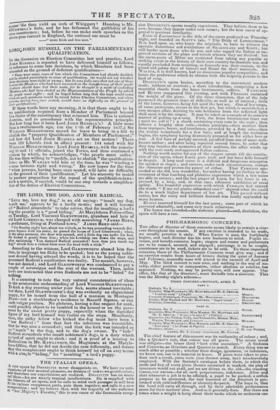THE ITALIAN OPERA.
NEW opera by DONIZETTI never disappoints us. We have no anti- cipations of new musical pleasure, no dreams of unkmwn gratification ; and .therefore our expectations are realized. DONIZETTI has no musi- cal ideas—his are merely musical recollections. He is supplied with the libretto of an opera, and Ile calls to mind such passages as will best fit its various component parts, puts them together, and calls it a new composition : and we believe that, with the majority of the audience at "her Majesty's Theatre," this is one cause of the favourable recep- tion DONIZETTI'S operas usually experience. They believe them to be new, because they appear under new names; but the true cause of ap- proval is previous familiarity. ..Lucia di Lammermoor is the title of the opera produced on Thursday night, and founded on Scarfs tale, " The Bride of Lammermoor:" It is bard upon us, who know the originals, to have to witness the operatic distortions and mutilations of SHAKSPEARL and SCOTT; but still harder upon those who do not, and who regard the Italian as im- proved versions of the plays and novels whence they are derived : but the opera-poets of Milan are restricted from taking any popular or striking event in the history of their own country for dramatic use, and equally precluded from resorting, as formerly was their custom, to the proud and palmy days of Greece and Rome for their materials. Sir WALTER, it is well known, had no dangerous popular sympathies ; and hence the preference which he obtains with the reigning powers in the land of song.
DONIZETTI'S opera begins, according to the convenient modern mode, without an overture ; a short introduction, comprising a few mournful chords from the brass instruments, suffices. TANIIICRINI and REIHNI reappeared this evening, and with PERSIANI sustained the weight of the piece. Of the three characters, that of the lady possessed the greatest share of difficulty, as well as of interest ; little of the latter, however, being felt until the last act. One of her songs, of some pretension, occurs in the first act, but which is nevertheless a very meagre affair, deriving its sole biilliancy from the reflected light shed upon it by the singer. It may be taken as a sample of its. author's manner of getting up a song. First, the brass instruments blurt out ( must we call it ? ) a chord, containing every note in the scale ; then follows a lengthy oboe solo—violins pizzicato—then another blast from trumpets, horns, and trombones, preceded by a flute solo—then the violins tremolando for a few bars; and at length the recitative begins, the symphony having dextrously prepared us for either love or war. A few bars of melody succeed, parodied from one of some well- known author ; and after being repeated several times, in order that they may impress the memories of their auditors, the affair winds up with the ever ready and approved Italian cadence. Nothing worth notice for any of the singers occurs till the conclu- sion of the opera, where Lucia goes mad, and her lover kills himself in despair. A long mad scene is a difficult and dangerous enterprise for speaker or singer ; and success, under such circumstances, stamps the character and proves the power of either. That PERSIANI suc- ceeded as she did, was wonderful ; her author having no feeling or dis- cernment of that touching and plaintive expression which a few notes
are able to convey; and the last prayer of Lucia for her lover is ex- pressed, by a long, and, in that case, offensive exhibition of vocal agility. The beautiful expression with which PERstam hod tittered the words " E tne nel pianto abbandoni cosi ?" showed what she could do in a much higher department oilier art. This passed without notice, but the noisy and brilliant farewell was loudly applauded by many hearers. HUBINI reserved himself for the last scene ; some part of which he executed admirably, and some very much otherwise.
The house was crowded—the audience pleased—and, doubtless, the opera will have a run.


























 Previous page
Previous page